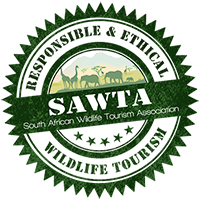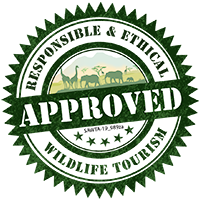REALITY: Extensive habitat loss forces previously free-roaming wildlife into Captivity or Extinction
FAQ
(click on question for more information)
SAWTA (South African Wildlife Tourism Association) is a certification and accreditation scheme that encourages wildlife tourism establishments and their associated industry partners to meet a set of standards and criteria, created by the SAWTA's group of experts and affiliated partners, that assures effective and long term wildlife conservation - both in the "wild" and captive facilities within South Africa.
The SAWTA provides an opportunity for individual wildlife facilities and associated industry partners/service suppliers to demonstrate their commitment to, and success in, protecting Africa's wildlife through Ethical & Responible Wildlife Tourism.
In addition, the SAWTA strives to create a conservation education platform through which the general public, the ecotourist & the travel industry in general, can be informed about our wildlife and industry in general.
A. Any wildlife establishment offering wildlife tourism (ecotourism) - i.e. wildlife reserves, game farms, sanctuaries, animal parks/zoos and any other captive wildlife facilities that are NOT involved with the lion hunting industry.
B. Tour/Travel Operators and other services that serves the wildlife tourism industry. C. NPO/NGO's and education establishments involed with wildlife, conservation, education, wildlife research and the wildlife tourism industry. D. Special members: individuals/groups that supports wildlife tourism and its role in conservation.To view a diagram of the various STEPS required - please CLICK HERE or for more information - CLICK HERE.
A. There is a once-off, non-refundable application fee of R1250/application to cover administration & processing costs.
B. Membership Options and Annual Membership fees (per application) are:
A direct PayFast link for payment is available on the left sidebar on the Registration as well as Membership pages, or just click on the PayFast button below:
After registation the applicant will undertake a self-assessment of whether management meets the SAWTA standards and criteria. The SAWTA partnership may provide capacity development and support to the self-assessment process.
In some cases there may be a number of management tasks or systems (programmes of improvement) that need to be put in place before compliance with the standards is reached. In these cases an action plan might need to be developed. Remember, the main aim of the SAWTA is to provide solutions and to assist the wildlife tourism industry in such a way that it will enable member establishments to sustainably support and conserve their wildlife under the best wildlife and tourism practices possible.
Adoption and implementation of SAWTA Ethical & Responible Wildlife Tourism standards ensure well-cared for and well-managed wildlife.
Building of regional capacity whereby the lives of people and wildlife in the region are improved through the setting & implementation of an Ethical & Responsible Wildlife Tourism Standard.
The SAWTA represents the interests of members and assists in facilitating the implementation of relevant actions/projects that will help to achieve ethical & responsible wildlife tourism in the region.
SAWTA Goals
SAWTA Objectives

Industry Standard
Build regional capacity to improve the lives of people and wildlife in the region through the setting & implementation of an Ethical & Responsible Wildlife Tourism Standard.

Certification & Accreditation
Facilitate and support an Ethical & Responsible Wildlife Tourism Standard for best practise wildlife tourism providers in South Africa through official SAWTA certification & accreditation.

Knowledge & Education
Generate knowledge and global understanding of Ethical & Responsible Wildlife Tourism, especially with regard to captive wildlife tourism facilities and destinations in South Africa.

Interest of members
Represent the interests of members and assist in facilitating the implementation of relevant actions/projects that will help to achieve ethical & responsible wildlife tourism in the region.
